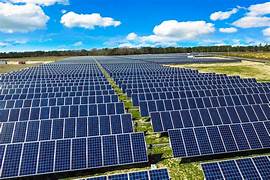Understanding Sun Solar Panels
Sun solar panel are devices that convert sunlight into electricity through the photovoltaic effect. When sunlight hits the solar cells within the panel, it excites the electrons, generating an electric current. This clean and renewable energy source provides an excellent opportunity to reduce carbon emissions and reliance on fossil fuels.
How Sun Solar Panels Work
Sun solar panel are made up of semiconductor materials such as silicon. When sunlight strikes the solar cells, it creates an electric field across the layers, resulting in the movement of electrons and the generation of direct current (DC) electricity. This DC electricity is then converted into alternating current (AC) electricity, suitable for powering homes, businesses, and communities.
Types of Sun Solar Panels
There are primarily three types of solar panels available in the market:
Monocrystalline Solar Panels
Monocrystalline panels are known for their high efficiency and sleek design. They are made from a single crystal structure, making them more effective in converting sunlight into electricity.
Polycrystalline Solar Panels
Polycrystalline panels are budget-friendly and give a nice balance between efficiency and affordability. They are made from multiple crystal structures, which can make them slightly less efficient than monocrystalline panels.
Thin-Film Solar Panels
Thin-film panels are light and bendy, and we can easily put them on different surfaces. They aren’t as efficient as crystalline panels, but they work great for certain uses and setups.
Installation and Maintenance of Sun Solar panel
To make sure sun solar panels work their best, it’s super important to install them properly. Talking to experts can help find the perfect spot and angle to get the most sunlight. And don’t forget to keep them clean and check for any damage regularly. This way, they’ll stay efficient and last a long time.
Government Incentives and Rebates
Various governments worldwide offer incentives and rebates to promote solar energy adoption. These may include tax credits, grants, or subsidies, making solar panels even more financially appealing.
Solar Energy and Cost Savings
Transitioning to solar energy results in substantial cost savings over time. With no fuel costs and reduced electricity bills, the return on investment for solar panels is impressive.
Sun Solar Panel for Residential Use :
Residential solar panels not only help homeowners save money but also increase the value of their properties. With advancements in technology, solar panels are now more aesthetically pleasing and can seamlessly integrate into the design of any home.
Sun Solar Panel for Commercial Use :
Businesses can significantly benefit from solar energy, both economically and environmentally. Installing solar panels on commercial properties can lead to substantial long-term savings, which can be reinvested to enhance the business further.
Dispelling Common Myths
While solar energy is gaining popularity, there are still some misconceptions surrounding solar panels. Let’s debunk some common myths:
- Myth 1: Solar panels are expensive and not worth the investment.
- Myth 2: Solar panels only work in sunny climates.
- Myth 3: Solar panels require constant maintenance.
- Myth 4: Solar panels are not suitable for businesses.
- Myth 5: Solar energy is intermittent and unreliable.
FAQs
- Are solar panels suitable for all types of buildings?
- Yes, solar panels can be installed on various types of buildings, including residential, commercial, and industrial structures.
- What is the payback period for solar panel investments?
- The payback period for solar panels can vary depending on factors such as location, system size, and local incentives. Furthermore, on average it ranges from 5 to 10 years.
- Do solar panels require direct sunlight to work efficiently?
- While direct sunlight optimizes the efficiency of solar panels, they can still generate electricity on cloudy days or in indirect sunlight.
- Can solar panels store excess energy for later use?
- Yes, solar panels can be connected to battery storage systems to store excess energy for use during times of emergency.


